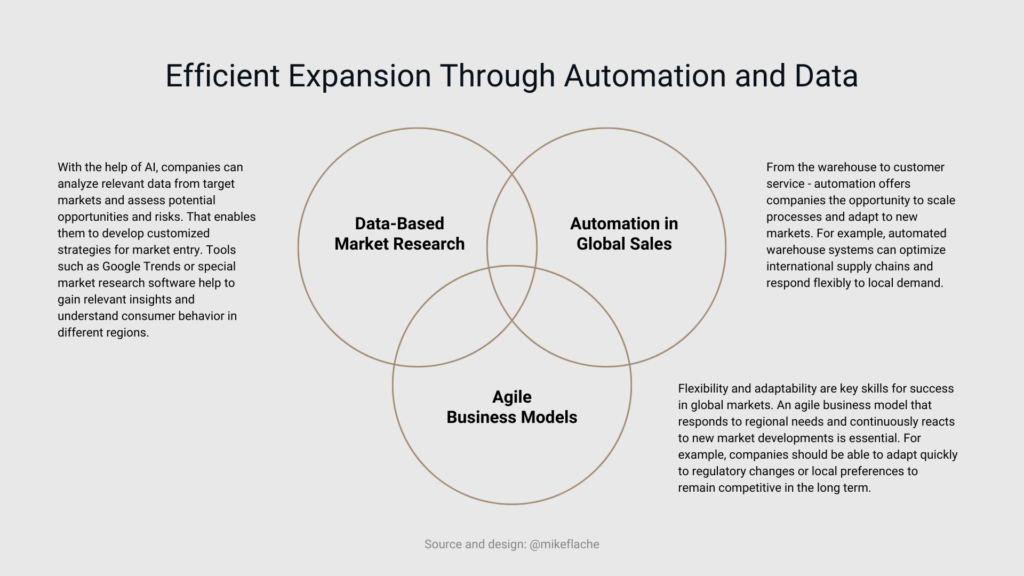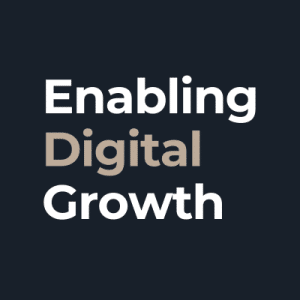Key takeaways
- Digital platforms lower barriers to market entry: E-commerce platforms, social media, and digital marketplaces enable companies to expand globally without investing in expensive physical infrastructure. Leveraging such platforms simplifies access to international markets while reducing costs.
- Data and automation optimize expansion strategies: Data-based market research and automated processes enable companies to enter new markets in a targeted manner. Automation increases efficiency, while data-based decisions facilitate a better assessment of the opportunities and risks in different regions and thus lead to informed expansion decisions.
- Platform ecosystems and digital partnerships accelerate growth: Digital cooperation, such as collaboration in platform ecosystems, offers companies access to new technologies and markets. These partnerships promote innovation and enable flexible, scalable expansion that can respond quickly to local requirements.
Globalization is undergoing a profound transformation. While, in the past, physical presence and logistical networks were crucial for market entry and expansion, digital transformation has created new avenues.
Globalization 2.0 refers to using digital tools and platforms to expand internationally and enter markets more efficiently. In my discussions with CEOs on this topic, we focus on one central question: What strategies are needed to remain competitive in this era?
The answer lies in an innovative mix of technology, data analytics, and flexible business models.
New market entry strategies through digital tools
Traditional barriers to market entry, such as high costs for physical presence or complex supply chains, can be reduced through the targeted use of digital platforms and technologies. Companies today use e-commerce platforms, digital marketplaces, and social media to enter global markets more quickly and efficiently.
- E-commerce as a door opener: Companies such as Amazon and Alibaba make it possible to offer products on international markets without much effort. These platforms provide integrated payment and logistics solutions, which make market entry much easier.
- Digital marketplaces and platform ecosystems: In addition to classic e-commerce platforms, specialized digital marketplaces such as Shopify or Etsy offer a flexible way to enter new markets without building up an extensive IT infrastructure.
- Social media as a sales channel: Channels such as Instagram, Facebook, and TikTok now function not only as marketing platforms but also as direct sales channels. Companies can market and sell their products directly worldwide via social selling.
However, the challenge is to adapt these platforms to local conditions and consumer expectations. Data analysis and customer segmentation are essential for this.
Best practices: efficient expansion through automation and data
One of the greatest opportunities in the digital age is the ability to use data-based decisions to make expansions more efficient. Artificial intelligence (AI) and automation play a central role in this.

- Data-based market research: With the help of AI, companies can analyze relevant data from target markets and assess potential opportunities and risks. That enables them to develop customized strategies for market entry. Tools such as Google Trends or special market research software help to gain relevant insights and understand consumer behavior in different regions.
- Automation in global sales: From the warehouse to customer service – automation offers companies the opportunity to scale processes and adapt to new markets. For example, automated warehouse systems can optimize international supply chains and respond flexibly to local demand.
- Agile business models: Flexibility and adaptability are key skills for success in global markets. An agile business model that responds to regional needs and continuously reacts to new market developments is essential. For example, companies should be able to adapt quickly to regulatory changes or local preferences to remain competitive in the long term.
Examples from the B2C and B2B sectors
Against this background, I want to mention Zalando and Siemens as representatives of various internationally successful players.
Zalando1 is an example of the successful use of digital tools and automation in the business-to-consumer sector. The company is expanding in Europe based on automated logistics solutions and data-driven customer communication – taking local customer preferences into account. On September 9, 2024, Zalando introduced a new brand identity as part of its growth strategy.
An example from the international business-to-business sector is Siemens2. The company has strengthened its market presence worldwide through digital platforms and automation. With “Insights Hub” (formerly MindSphere), Siemens has developed a digital industrial platform that enables companies to network industrial machines and systems to collect and analyze data and thus optimize production processes (Industrial IoT).
Future of expansion: platform ecosystems and digital cooperation
In the future, cooperation in digital platform ecosystems will become increasingly important. Companies must think beyond the classic supply chain and network with other players in digital ecosystems.
- Digital partnerships: Cooperation with local players, start-ups, or technology companies can help to open up new markets more quickly. Examples of this are joint ventures or partnerships that combine technological expertise and local knowledge to offer tailor-made solutions.
- Platform ecosystems as growth accelerators: One example is the AWS Cloud, which enables companies to quickly scale their products and services worldwide while responding flexibly to market requirements. Via platforms such as AWS Marketplace, companies can offer innovative solutions worldwide without making major investments in their IT infrastructures.
- Local adaptation through digital solutions: To expand globally, companies must take local market requirements into account. Digital platforms often offer modules or add-ons that make it easy to adapt products and services to regional specifics. Payment service providers such as Stripe or PayPal, for example, provide tailor-made solutions for international payment processing and local currencies.
The ability to adapt quickly to technological and market changes will be crucial to success in the new age of globalization. Therefore, companies must invest in digital skills while being open to new forms of collaboration.
Conclusion
Whether in the B2C or B2B sector, Globalization 2.0 offers companies enormous opportunities to enter new markets efficiently.
Despite these opportunities, I want to emphasize again how critical a well-thought-out strategy is in this context: leveraging digital platforms and tools, supported by data-based decisions and automation, enables flexible and scalable action.
I recommend that CEOs who want to expand efficiently now take the opportunity to rethink their previous market entry strategies and take advantage of digital technologies as a driver for international growth.
Start with a comprehensive analysis of the target markets and evaluate how digital platforms can support your global ambitions. The future of expansion is digital – and it starts today.
Sources
- “Zalando’s Automated Expansion Across Europe,” European Business Review, 2023.
- Siemens MindSphere: “Benteler Automates Global Manufacturing with Siemens MindSphere,” Siemens Case Study, 2023.

